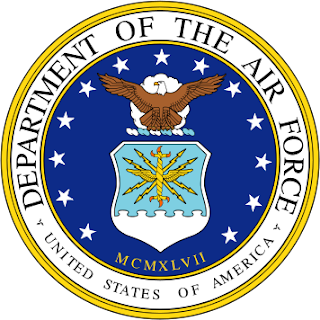Today, in 1947, our United States Air Force (USAF) was created (through the National Security Act of 1947).
The USAF is the aerial warfare service branch of the United States military and one of the seven American branches of armed forces. It is the youngest branch, but also one of the most technologically advanced in the world.
The Air Force is a military service within the Department of the Air Force, one of three departments within the Department of Defense. The USAF is headed by a civilian Secretary of the Air Force, who is appointed by the President and approved by the Senate.
In general the United States Air Force shall include aviation forces both combat and service not otherwise assigned. It shall be organized, trained, and equipped primarily for prompt and sustained offensive and defensive air operations. The Air Force shall be responsible for the preparation of the air forces necessary for the effective prosecution of war except as otherwise assigned and, in accordance with integrated joint mobilization plans, for the expansion of the peacetime components of the Air Force to meet the needs of war. -National Security Act, 1947.
The purpose of the USAF is to preserve the peace and security, and provide for the defense, of the United States, the Territories, Commonwealths, and possessions, and any areas occupied by the United States; to support national policy; to implement national objectives; to overcome any nations responsible for aggressive acts that imperil the peace and security of the United States. -§8062 of Title 10 U.S. Code
The stated mission of the USAF today is to "fly, fight, and win in air, space, and cyberspace." That's right, cyberspace as well.
The USAF takes great pride in its creativity, air shows, technology and engineering, science, and holds events regularly around the country.
One of the USAF's most exciting and coolest interests is its science! It works with lasers, micro air vehicles, g-forces, remotely piloted aircraft, GPS and satellites, supersonic and other forces in flights, and more. In addition, the Air Force Research Laboratory is constantly discovering and developing new war-fighting technologies for our air, space, and cyberspace forces.
The USAF doesn't also work for our great country; it also serves mankind. It helps assist in humanitarian crises via air deliveries, fire response, goodwill, and more.
The United States Air Force may be less than 70 years old, but it has accomplished quite a bit in its time.
HAPPY BIRTHDAY, AIR FORCE!

